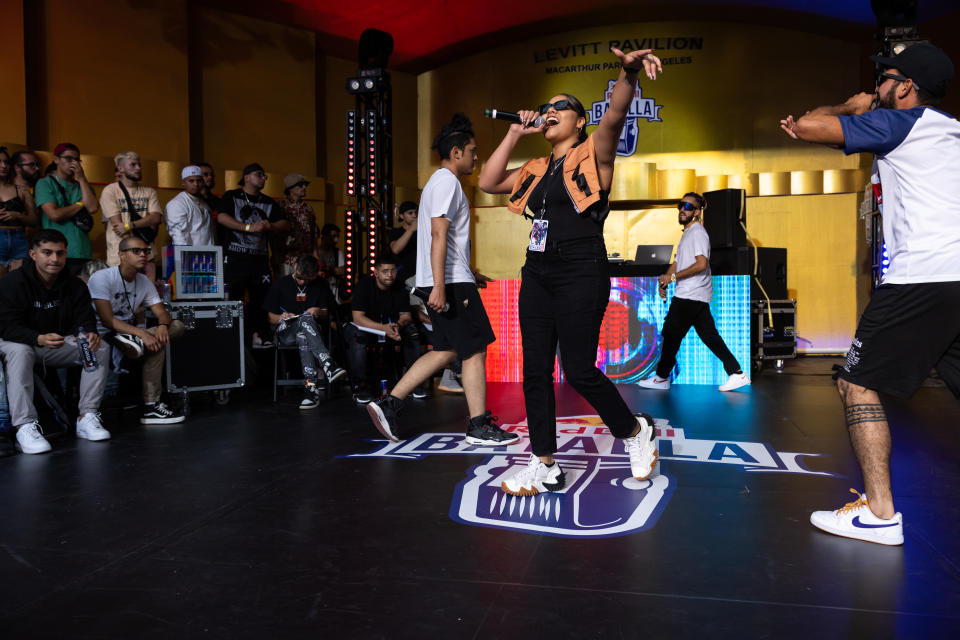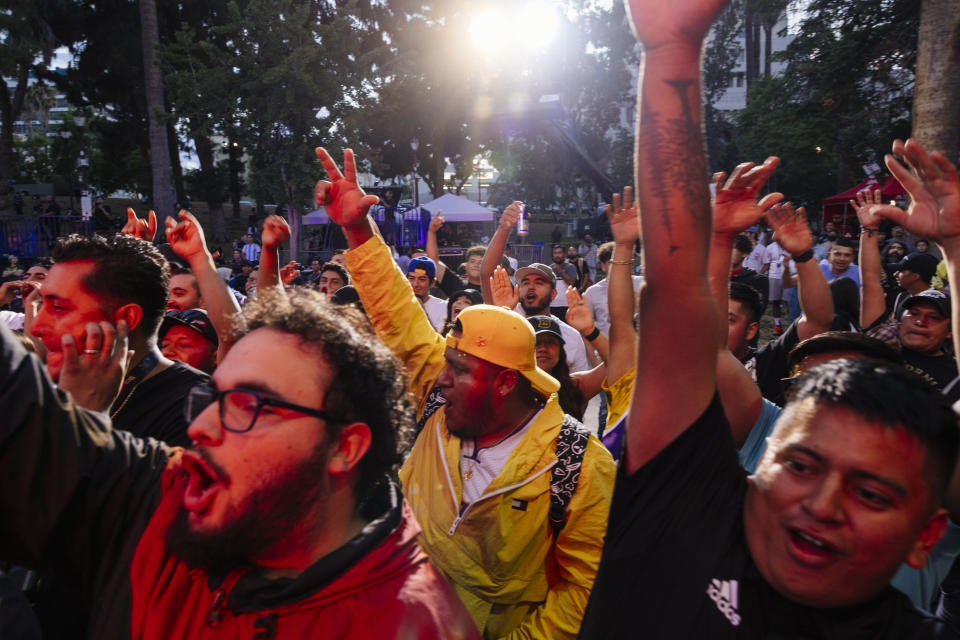Mykah Makes History As Red Bull Batalla’s First USA Woman Competitor
- Oops!Something went wrong.Please try again later.

Born Greta Michael Ramirez Garcia, rapper Mykah quite literally transcended barriers to be here. It’s the 2022 Red Bull Batalla final qualifiers in Los Angeles; Mykah is not only the sole woman among a cadre of men competing for a spot at the upcoming nationals in Miami this October. She’s also the first-ever female U.S. competitor, but none of this would be possible had she not braved crossing the frontier that separates her home of Tijuana and the city of San Diego.
“A mi no me meten miedo, primero me meten balas, porque en este mundo se trata de plomo o plata,” she raps on “Atraco,” using part of the famous Narcos line to illustrate the rhyme and reason behind her lion heart. “They don’t put fear in me, first they put bullets in me,” it loosely translates. On “Lecciones de Mami,” she renders homage to the single mother who raised her while revealing in braggadocio having crossed the border as a “morrita” before learning English. “Of course the song to give me credit and notoriety as a rapper is one that I dedicated to my mother and everything she has taught me,” she tells VIBE while poolside at The LINE LA in Koreatown.
More from VIBE.com
Mykah grew up a latchkey kid about 30 minutes from the U.S.-Mexico border. Her single mother was often away working on the other side of the proverbial wall. It forced Mykah to raise herself as early as five – bathing, cleaning, cooking – while her older sisters focused on their respective educations. As for her absentee father, who endured his own set of personal traumas, she admits he was an alcoholic and womanizer, who cared deeply in his own way. The 23-year-old uses these familial factors, her personal struggles, and her lived experiences to inform her rap ethos. What’s more Hip-Hop than talking about “the beautiful struggle,” right?

But Mykah didn’t grow up listening to rap. She was raised on Mexican pop phenoms like Jenny Rivera and Gloria Trevi. Her sonic diet was a hodgepodge of boleros and rancheras and regional favorites. Mykah had never heard of Tupac Shakur until last year, let alone the scratch pioneer that is DJ Kool Herc. Forced to quarantine at the onset of the 2020 pandemic, she discovered an innate talent for freestyling when she regularly took to TikTik with off-the-cuff rhymes. Like many of us during COVID, Mykah learned that necessity is the mother of reinvention, and her knack for language quickly became her life’s compass.
That compass would later lead her straight into cyphers around San Diego, including the all-woman Latinx collective of Callejera, a digital platform for Spanglish mamis who express themselves in the streets.
“I was inspired to start rapping, really, because I realized that there’s something big happening with women in music, especially Hip-Hop,” Mykah adds, talking in her acrylic adorned hands with her ring fingernail flashing Our Lady of Guadalupe, a strong symbol of Mexican identity. “Since I was a kid, I was always telling jokes, performing for my sisters in our living room. I thought, let’s see how far I can actually go with this rap sh*t.”

“Let’s see how far I can go with this rap sh*t” is the attitude integral to the unique blueprint laid out by some contemporary favorites, such as Cardi B and City Girls, who started out in other industries or line of work and instead used the digital space and music making as a means to climb social ladders and income brackets. Mykah, then, is following suit in the era that Issa Rae’s recently premiered HBO series Rap Sh!t aptly dubbed “a bad bi**h renaissance.”
Live cyphers, local collaborations, and YouTube videos continued to increase the notoriety Mykah needed to ultimately emerge as the first-ever woman competitor at the annual Red Bull Batalla. But the confidence she exudes holding court on this stage is a far cry from how she started. The first time she intended to participate was in 2020, when she psyched herself out of submitting an original freestyle to the Red Bull competition. “I make an account. I record myself. I don’t send sh*t. I chicken out. I thought, ‘Oh my God, this is a mistake, who the hell do I think I am?’” she recalls.
Mykah is her mother’s very “chingona” daughter, and thanks in part to her community of artists, including her romantic partner, she was practically ushered into this year’s battle. She prepared for this life-changing opportunity by studying her predecessors on YouTube and other digital forums. “Everything from body movement to the way that you wait while your opponent is performing or doing their thing,” she shares. “The way somebody can harass you and throw you off your game—how to avoid that. I’m still learning the format and the nature of how the rounds work, but I know timing is everything.”

As she performs before a diverse crowd of families and local fans in L.A., Mykah delivers an impressive double-tie-breaker (a first in the course of this event) and lyrical showdown during her first-ever Red Bull Batalla freestyle, despite becoming a target of cheap, sexist shots. “Yo hago esto pa las morras que se atreven as soñar,” she screams in response, repping for all the youth who dare to dream back in her native country. For the Tijuana-born lyricist, though, freestyle is about more than aesthetics and combatting the ways in which her male peers objectify her; it’s equally about creating her own opportunities as an undocumented person living in the United States, inspiring other children of immigrant households to do the same.
Though Mykah did not move on to nationals in Miami, Mykah’s Red Bull Batalla participation gained her new audiences and music opportunities, including running the independent circuit with club performances throughout Los Angeles and San Diego.
“Nothing positive is said about where I come from,” Mykah says, as we exit the hotel and make our way to soundcheck. “What you hear is about narcos, human trafficking, smuggling at the border, prostitution—you don’t hear anything positive about my city, and I’m proof that there is more. Brown, chubby, chingona, and all. I’m tired of playing small. I don’t want to feed any more cynical panics. I can no longer afford to be afraid. I’m tired of that sentiment. I want to enjoy every second of every day and savor my time here until the end. Win or lose.”
—
This interview has been translated from Spanish to English, condensed, and edited for clarity.
Best of VIBE.com

